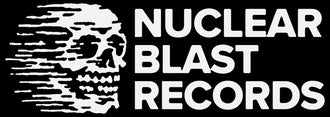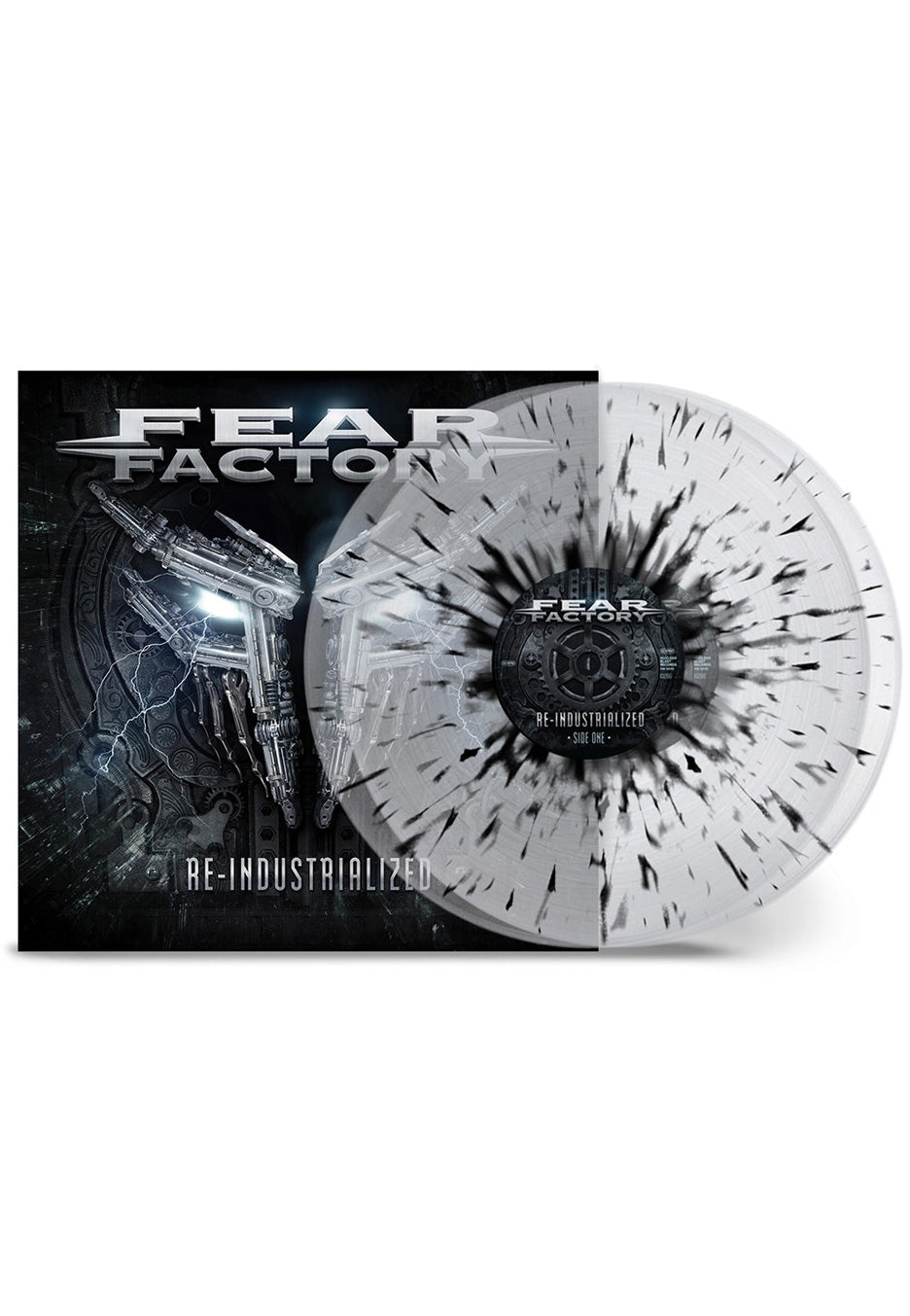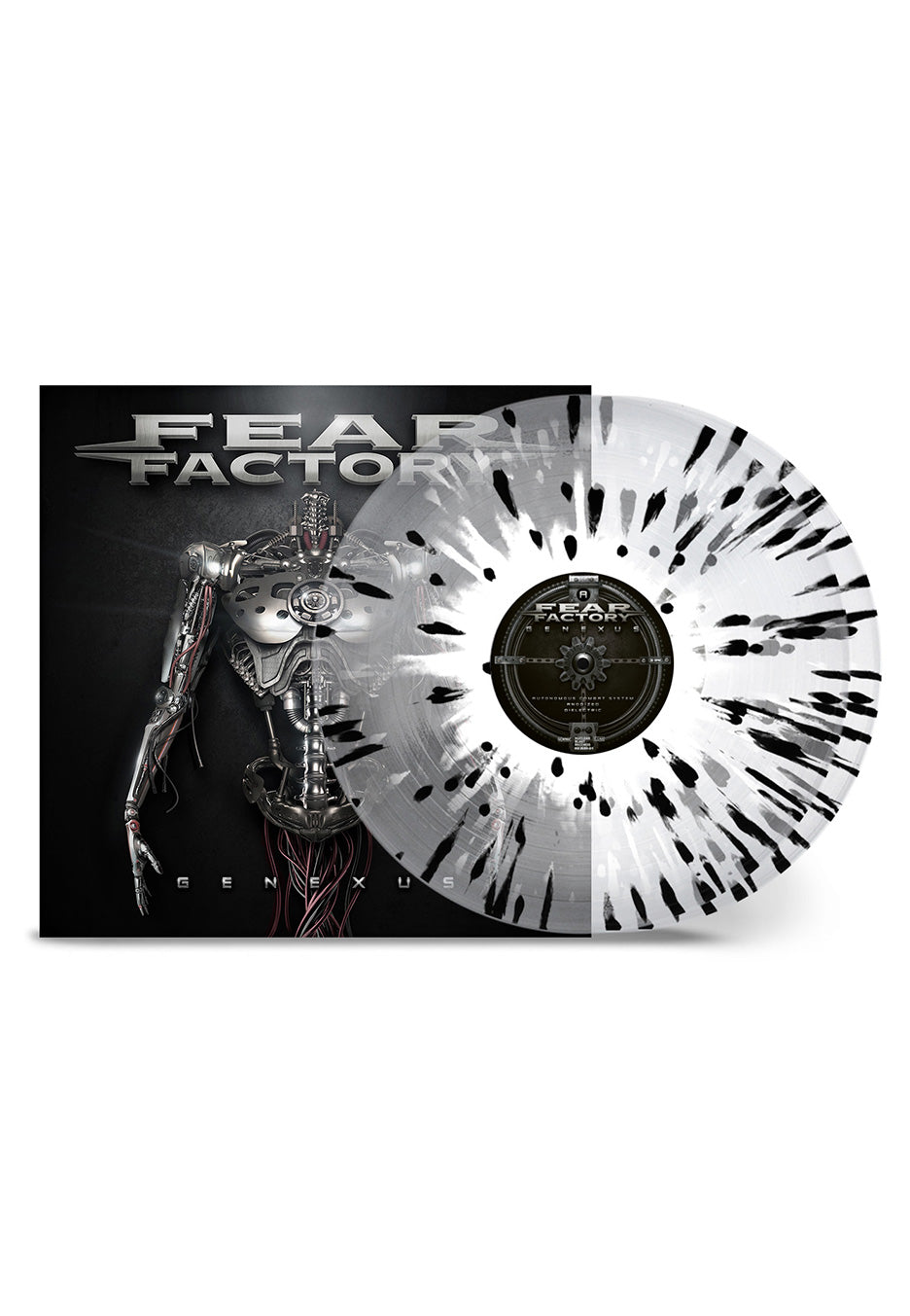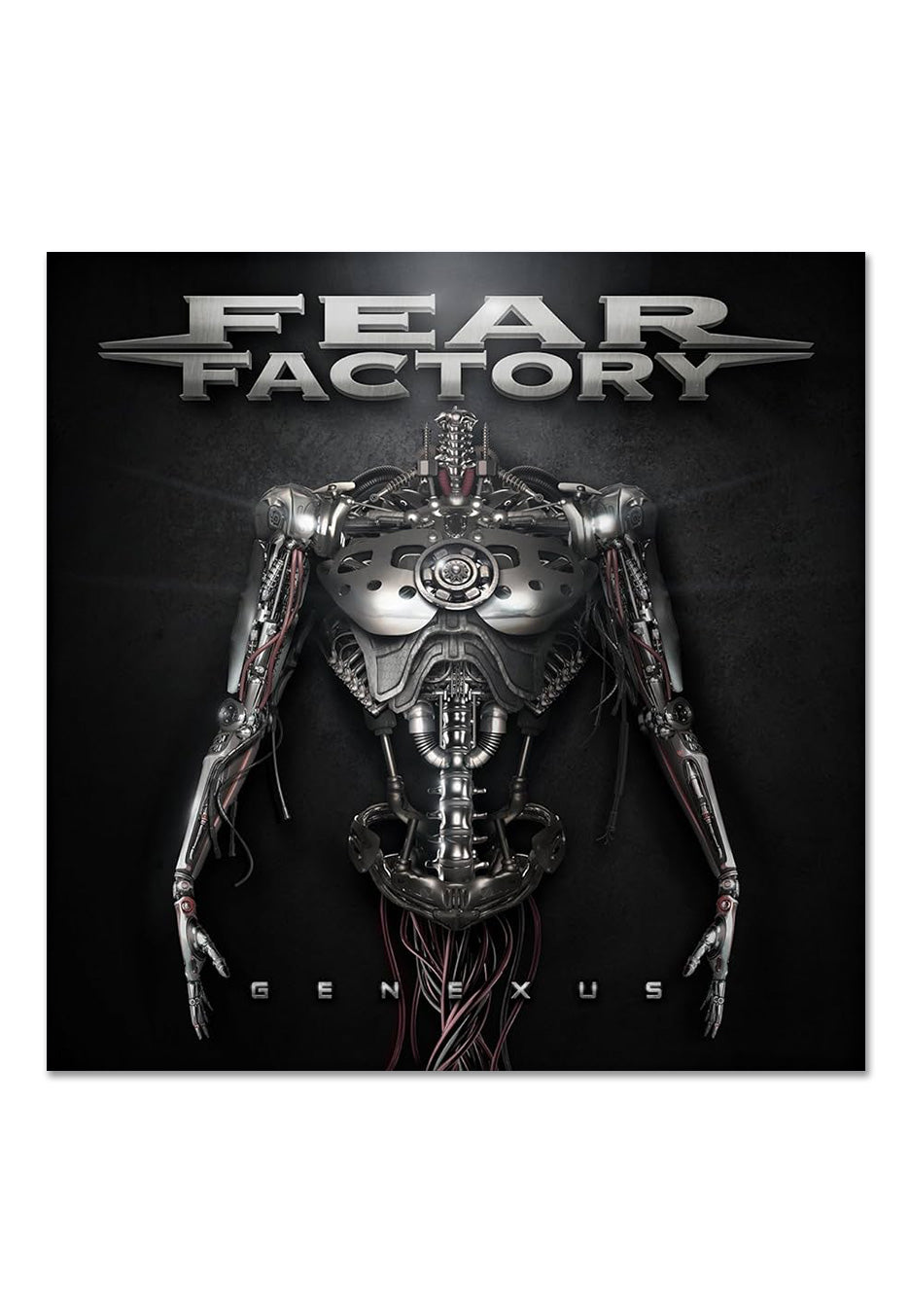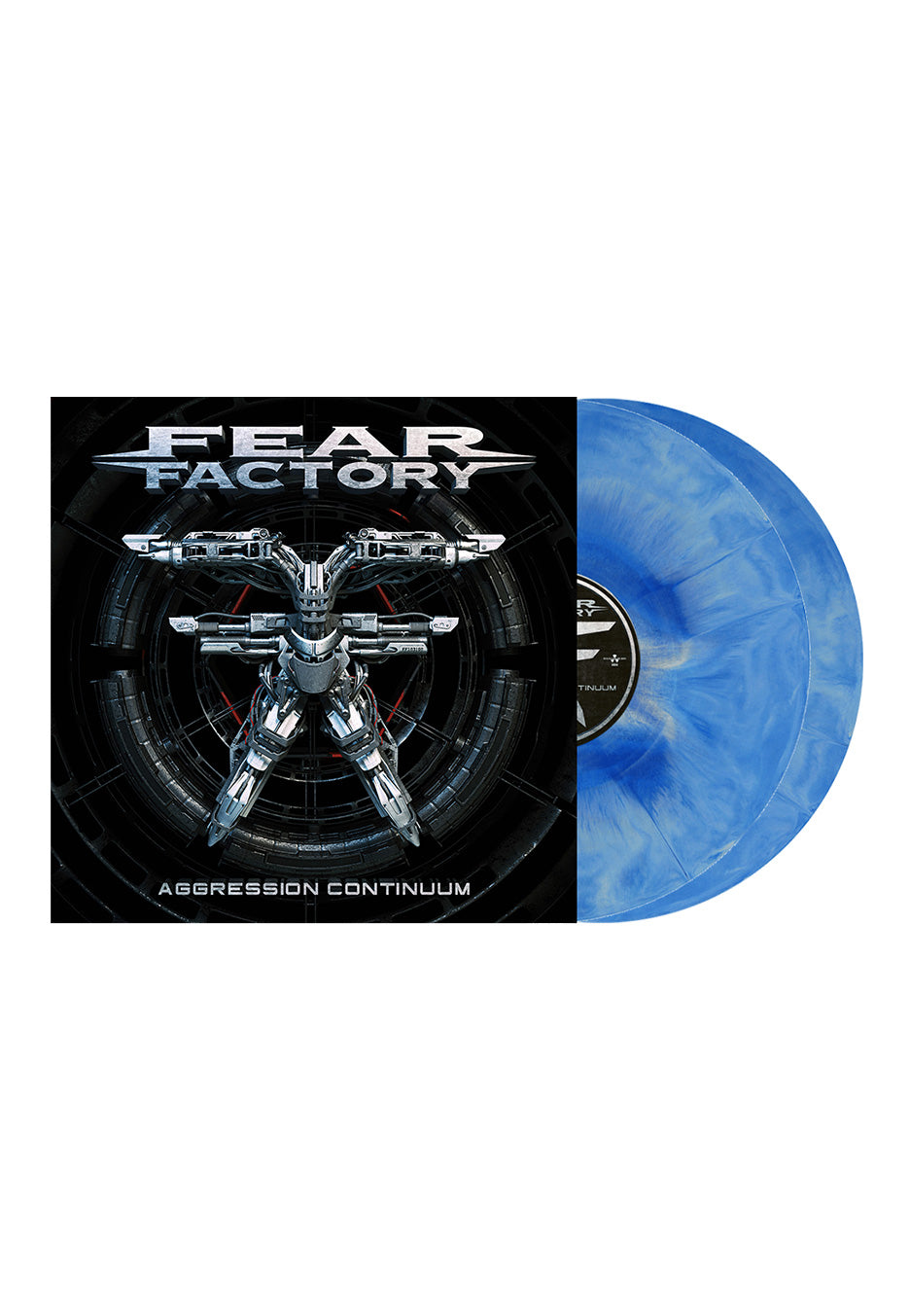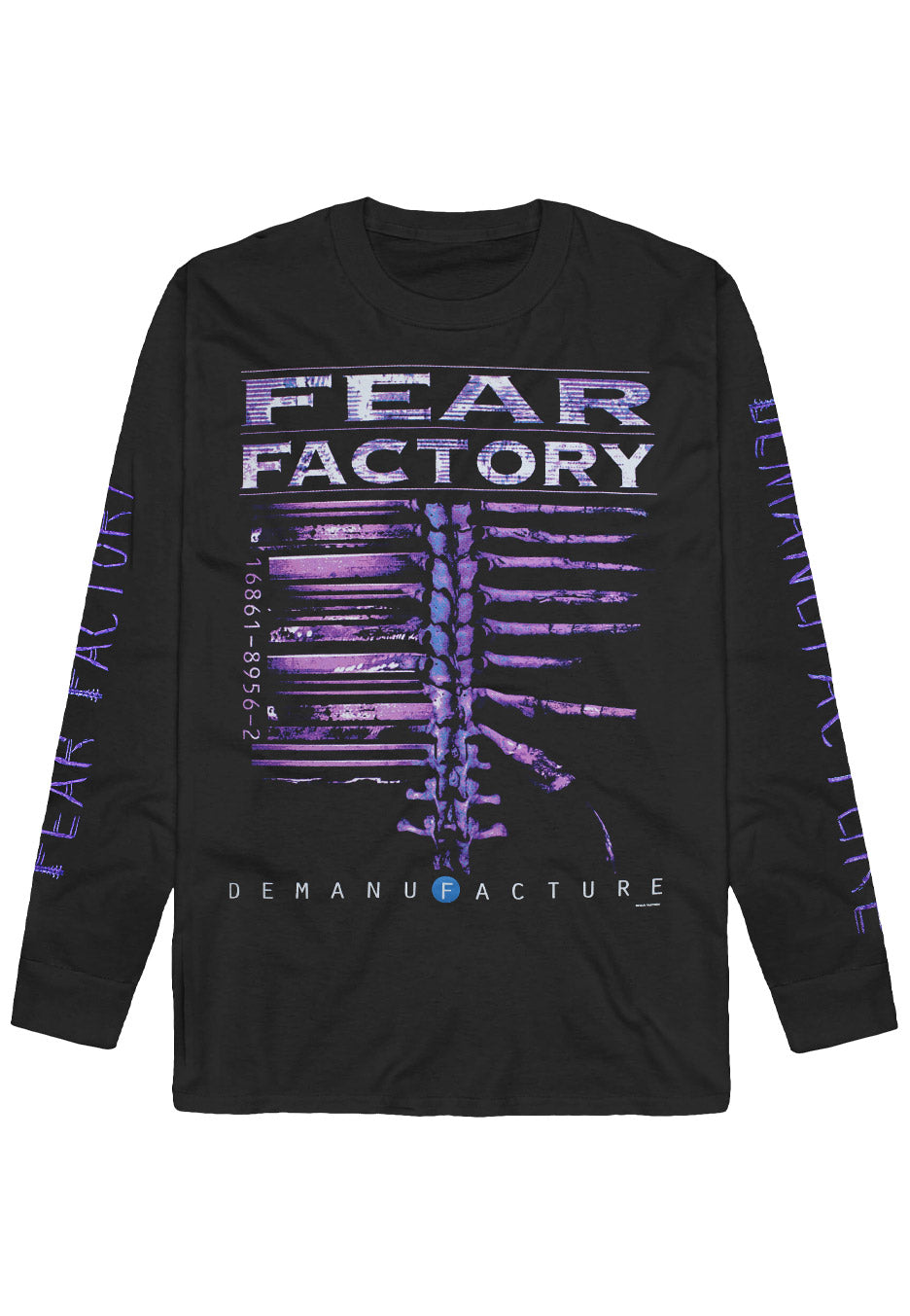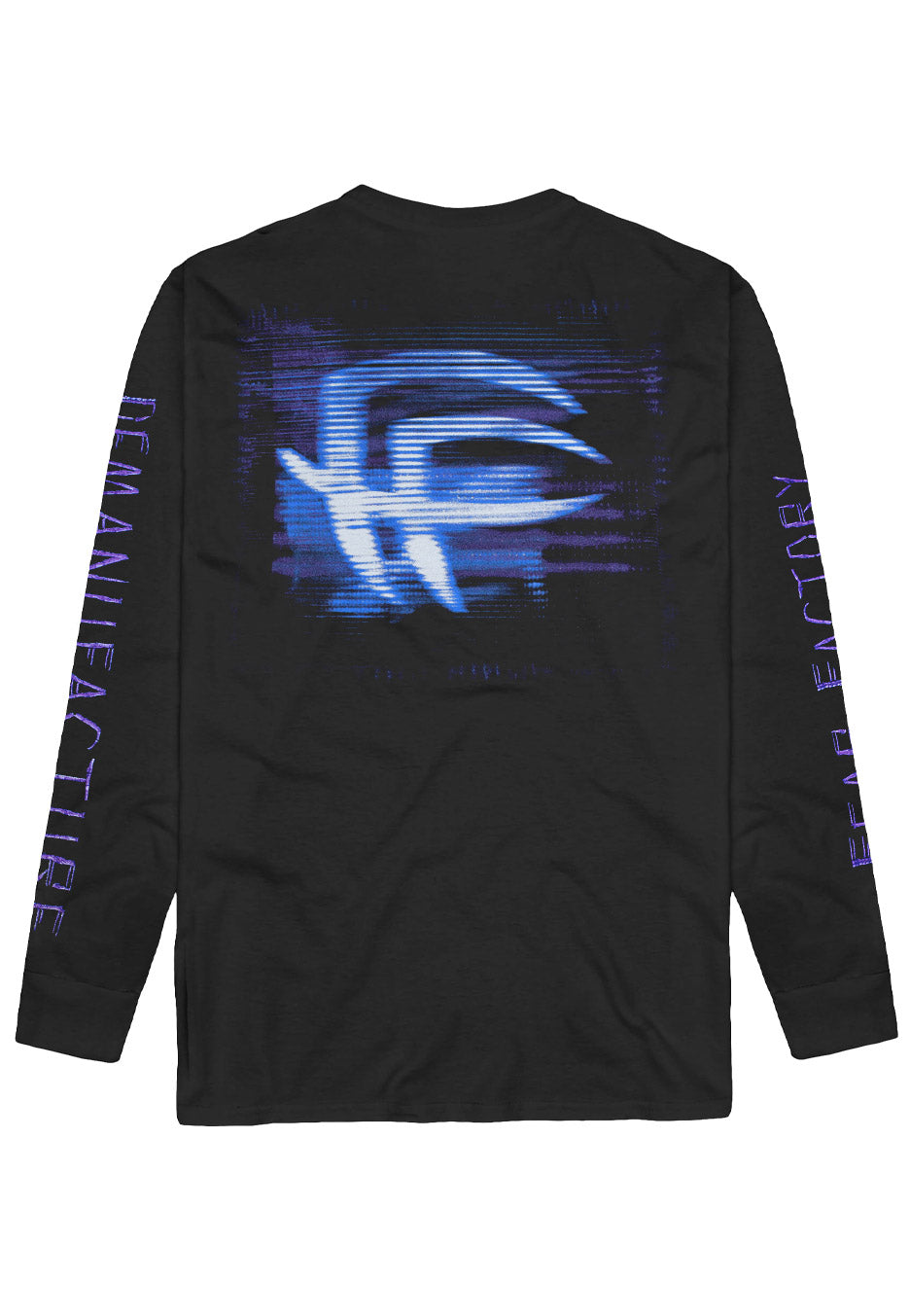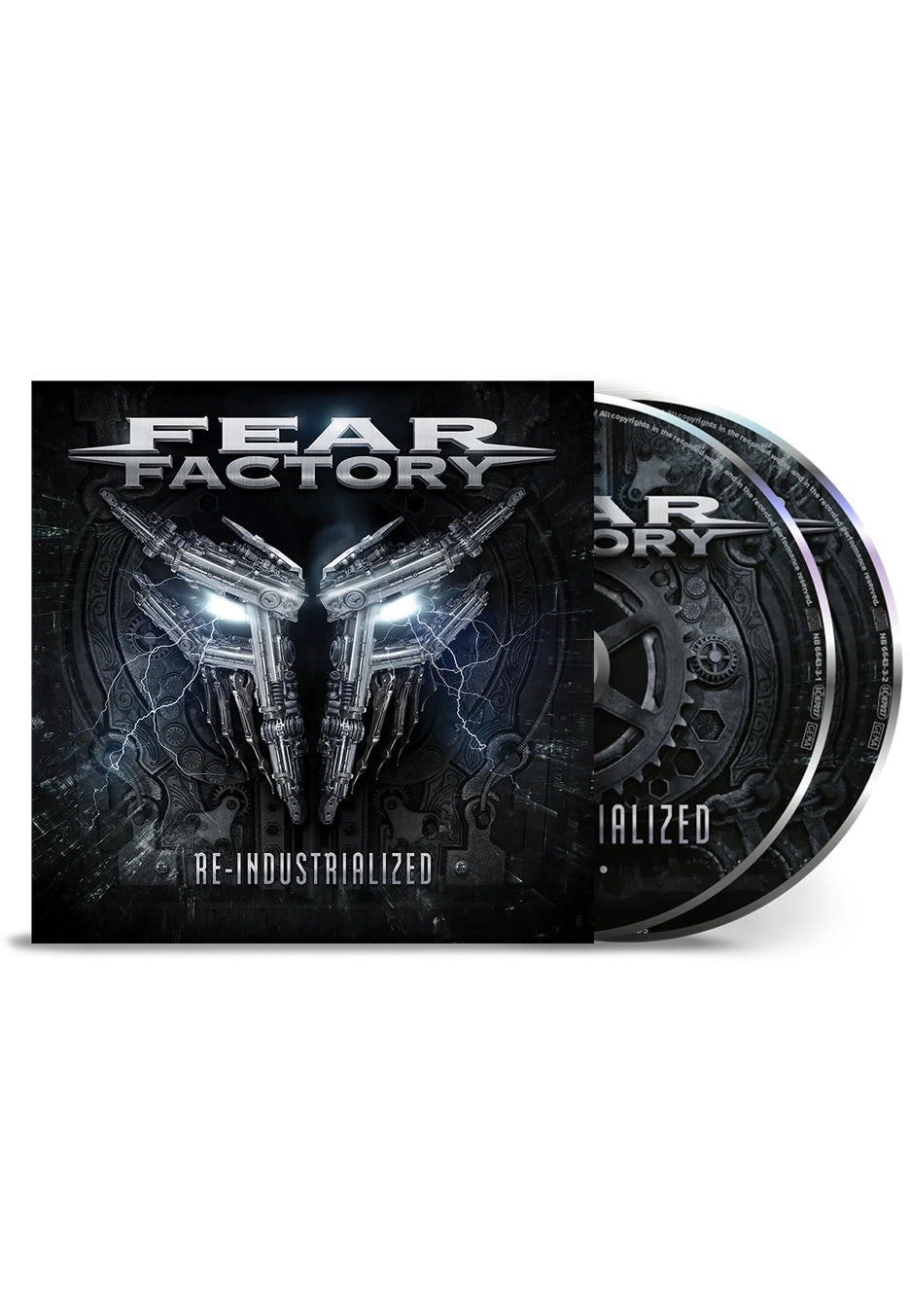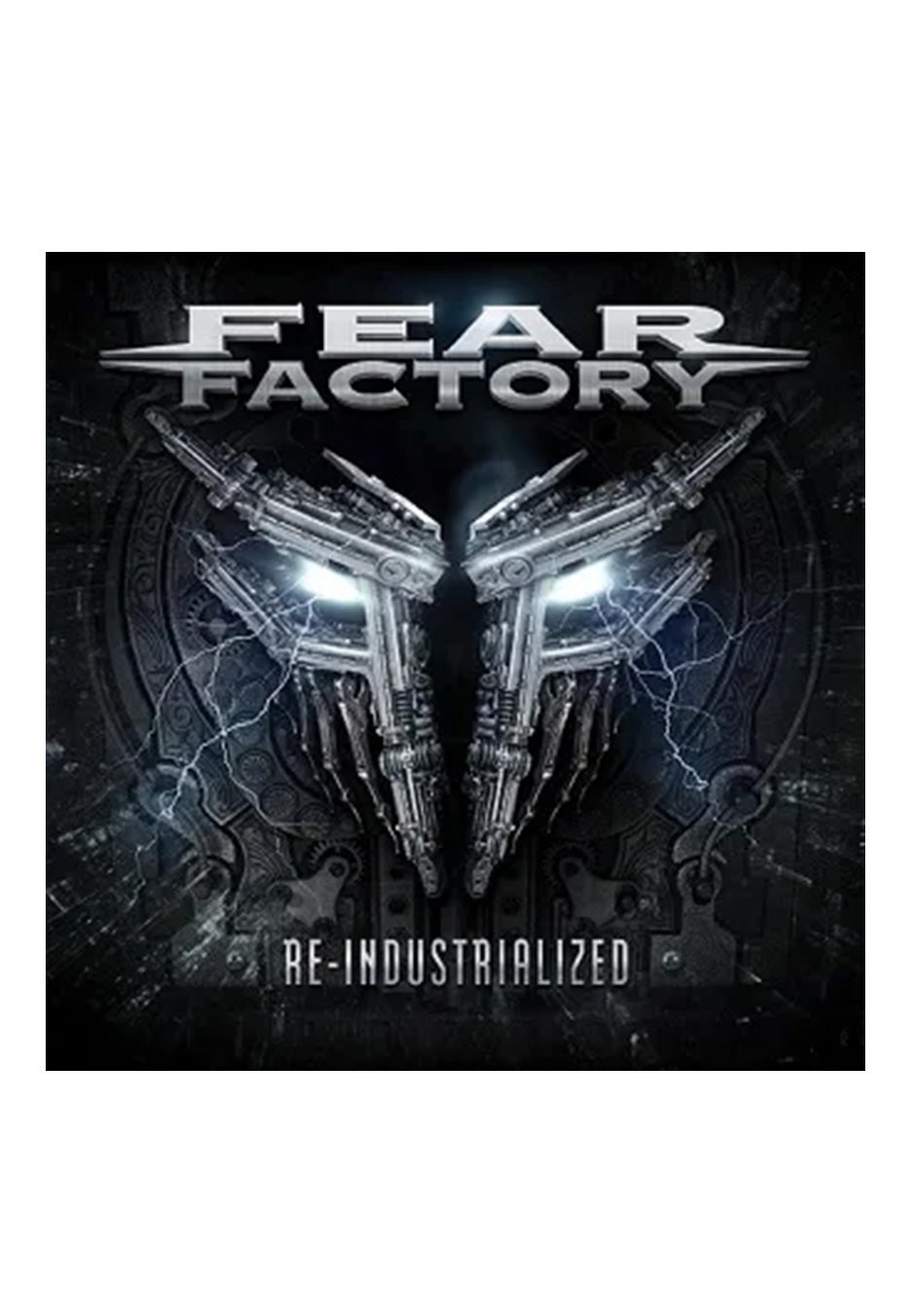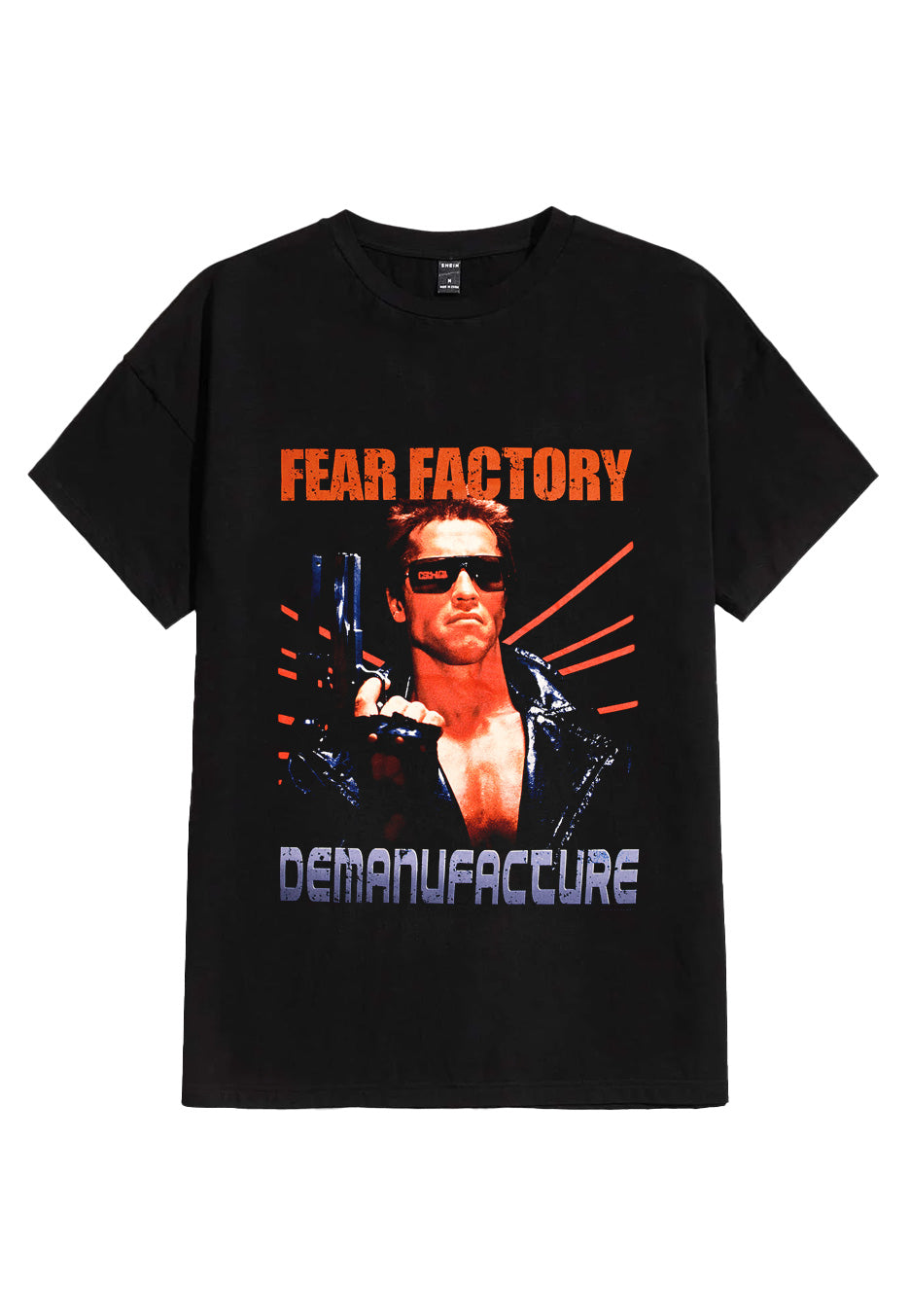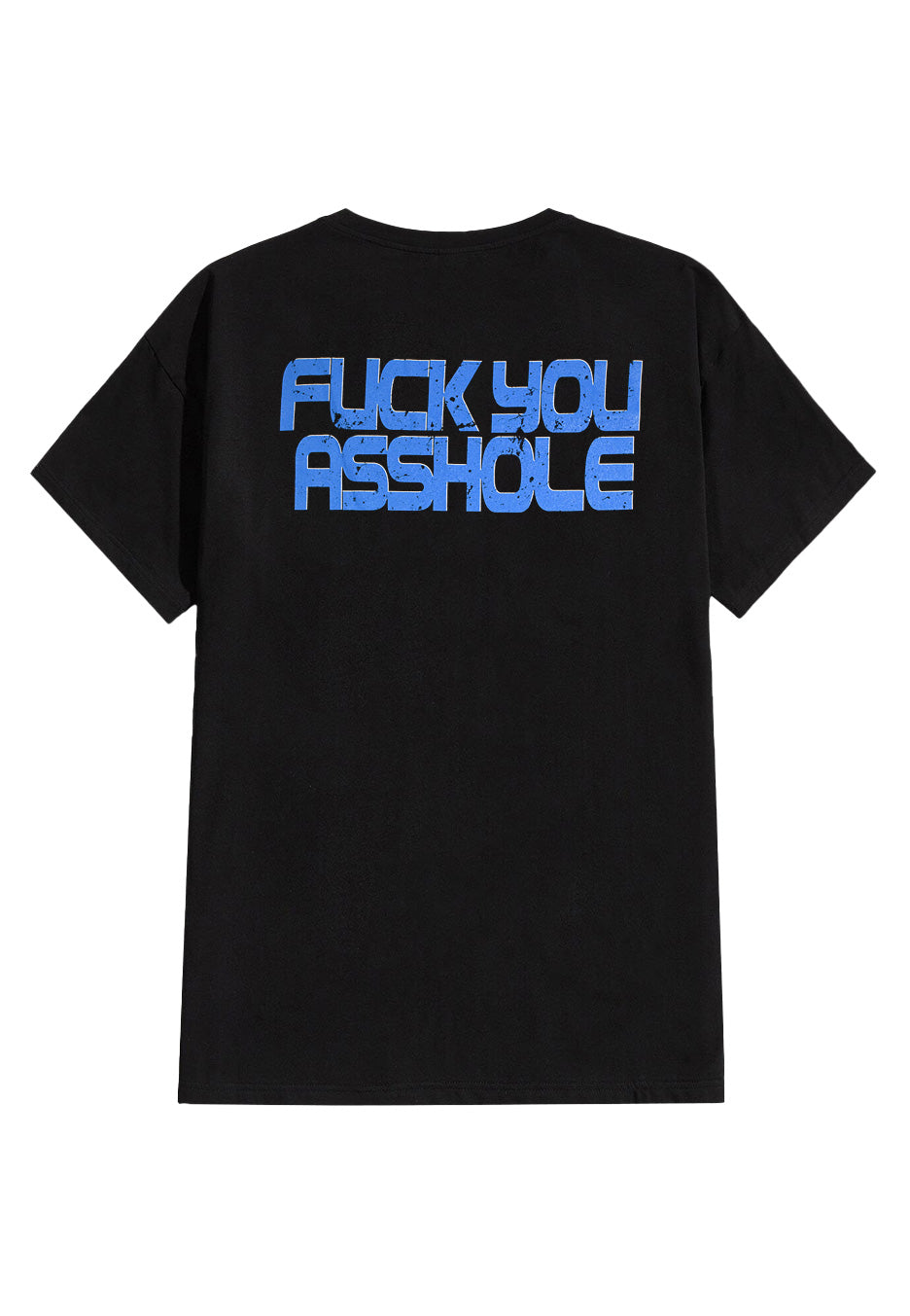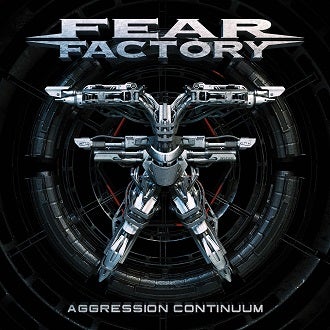
Fear Factory
Aggression Continuum
Release:
Tracklist:
- Recode
- Disruptor
- Aggression Continuum
- Purity
- Fuel Injected Suicide Machine
- Collapse
- Manufactured Hope
- Cognitive Dissonance
- Monolith
- End of Line
One can’t overstate the size of the FEAR FACTORY boot print on the neck of heavy metal. Unleashing influential albums with devastating anthems for over 30 years, FEAR FACTORY is widely recognized as both crucial and innovative in extreme metal circles. FEAR FACTORY manufactured, demanufactured, and remanufactured a sound that reverberates across several subgenres. They perfected an explosive blend of staccato paint-stripping riffs, industrial-tinged drums, electronic flourishes, and a scream/sing dichotomy, all of which became staples in heavy music, ever since the group first emerged in L.A.
FEAR FACTORY headline major festivals; earned several awards from the international sales charts; toured with legends like Black Sabbath, Slayer, Iron Maiden, and Metallica; performed at three Ozzfests; and influenced generations of bands who achieved multiplatinum success. But it’s the group’s commitment to unrelenting extremity and creative authenticity which ensured its place in heavy metal history, from the touchstone masterpiece Demanufacture to the similarly dominating Genexus.
FEAR FACTORY records are cinematic in scope; sonic landscapes, echoing the dystopian post-apocalyptic futures found in classic sci-fi literature and films, from Ray Bradbury to Blade Runner. Aggression Continuum, the tenth studio album, is the culmination of three decades of unforgettable songs, performances, and forward-thinking storytelling concepts, while simultaneously rebooting FEAR FACTORY onto a brilliant and excitingly unpredictable new path. Like the liquid metal T-1000 in the Terminator franchise or the Academy-Award winning reboot of Mad Max, Aggression Continuum is a turning point where what “was” transforms into what will be. It’s FEAR FACTORY’s own Fury Road.
Aggression Continuum features guitarist, songwriter, and cofounder Dino Cazares; drummer Mike Heller; and vocalist, lyricist, and cofounder Burton C. Bell. It was produced and engineered by Damien Rainaud (DragonForce, Once Human), with keyboards by Igor Khoroshev (ex-Yes), and programming on two songs from longtime collaborator Rhys Fulber (Front Line Assembly). Aggression Continuum was mixed by A-list rock and metal producer Andy Sneap (Megadeth, Killswitch Engage, Trivium), who also mixed the album’s critically-acclaimed predecessor, Genexus.
The 1992 arrival of Soul of a New Machine introduced FEAR FACTORY to the world. It was the same year as the L.A. Riots; Sinéad O’Connor tearing up a picture of the Catholic Pope on T.V.; an E. coli outbreak; Dr. Dre’s The Chronic; and the launch of the first Mortal Kombat video game. Unrest, paranoia, seething contempt for the powerful elite and a rejection of mindless consumerism powered songs that proved both timely and timeless. Cazares, already a young veteran of the local thrash metal scene, combined his love for death metal and grindcore with a precision picking attack. Bell’s pioneering blend of death metal howls and soaring melodic singing was similarly revelatory in metal.
Years before computerized drum samples were ubiquitous in metal, Raymond Herrera’s powerhouse and authentic performances, combined with Dino’s almost mechanical sounding style of riffing, begged the question: “are these men or machines?” FEAR FACTORY intertwined their sound, art, and themes, warning of a potential technocratic apocalypse, creating a soundtrack of impending dread.
The 1993 remix E.P. Fear is the Mindkiller began a career-long partnership with Fulber, the mastermind of industrial icons Front Line Assembly, and mixer Greg Reely. Fear is the Mindkiller’s combination of man and machine was the gateway to the futuristic masterpiece which followed.
Demanufacture stunned the scene when it emerged in 1995. During the Demanufacture sessions, Cazares butted heads with Colin Richardson over the album’s creative direction, which led to the producer’s firing. Reely was reenlisted to mix the album, which cemented Demanufacture as a groundbreaking classic.
“Demanufacture was so far ahead of its time that bands are still failing to rip it off convincingly today,” wrote Metal Hammer, before the record arrived on vinyl for the first time in 2020. As Kerrang! declared in an anniversary retrospective on the album, “Demanufacture was so innovative that it sounds as fresh today as it did then; a blistering collision of metal and hardcore that easily rivals any of its peers. In short, a masterpiece.” Decibel Magazine inducted the album into their Hall of Fame, alongside massively influential classic releases from Metallica, Slayer, Scorpions, and Judas Priest.
Demanufacture was certified Gold in Australia and Silver in the United Kingdom. It even cracked the Top 10 in Billboard’s Heatseekers chart in the United States, a minor miracle for a record so extreme. Producers added “Zero Signal” to the Mortal Kombat film soundtrack (alongside KMFDM, Orbital, and Type O Negative), which was certified platinum by the RIAA for sales in excess of 1 million copies.
Cazares performed both guitar and bass on Demanufacture. The addition of Christian Olde Wolbers in the live setting cemented the “classic” lineup of Dino, Raymond, Burton, and Christian. This version of the band supported Demanufacture on the road, delivering unstoppably energetic performances on several worldwide tours. Among them: treks with Sabbath, Maiden, Megadeth (as part of a package that included a young Korn), and Ozzy Osbourne, including an appearance at the very first Ozzfest in 1996. (FEAR FACTORY would go on to participate in Ozzfest again in 1997 and 1999.)
The groundbreaking remix album Remanufacture – Cloning Technology arrived in 1997, well before modern metal bands normalized doing “reimagined” versions of songs (let alone still new songs). A then-29 year old Thomas Holkenborg aka Junkie XL handled several of the songs, years before his hit remix of “A Little Less Conversation” by Elvis Presley and blockbuster film scores including Deadpool Batman v Superman: Dawn of Justice, Zack Snyder’s Justice League, and Godzilla vs. Kong.
The continuing evolution of the group’s cinematic sound manifested on Obsolete, a full-blown concept album (crafted in part at Vancouver’s legendary Armoury Studios) with the lyrics presented in screenplay format in the CD booklet. The presence of Fulber’s production and keyboards, together with Reely’s mixing, loomed even larger than before. Cazares used 7-string guitars, tuned down to A standard. Wolbers used an upright bass on “Edgecrusher.” The Vancouver Symphony Orchestra performed on “Resurrection” and “Timelessness.” (The band reached out to Sarah McLachlan to add guest vocals to “Timelessness,” but after hearing their music, she respectfully declined.)
The album went gold in America, the UK, and Australia, but was as uncompromising as ever, further perfecting Fear Factory’s formula. “Descent” broke into the Mainstream Rock Top 40 in the United States. A cover of the ‘80s hit “Cars,” recorded as a B-side with guest vocals from Gary Numan himself, entered the Top 20.
They toured with Slayer and on the Ozzfest mainstage. They headlined in Europe and North America, where they took System Of A Down and Static-X (featuring future bassist Tony Compos) as support. The band continued making inroads into other media, including video games. Herrera was an innovator there, hand-delivering FEAR FACTORY music to game designers well before it was the norm. They even performed on the MTV/WCW Beach Brawl during Spring Break 1999, which featured Kid Rock.
In 2001, FEAR FACTORY entered the Mainstream Rock Top 40 again, with “Linchpin” (which later became their biggest song in the streaming era), from their fourth album, Digimortal. Fulber produced, with mixing handled by Mike Plotnikoff (P.O.D., Papa Roach, Mudvayne). The record entered the Top 10 in Australia, Top 20 in Canada, and Top 40 in the U.S. on the back of successful tours in Japan, Australia, New Zealand, Europe, and North America.
But despite the success, all was not well within the camp. Digimortal boasts many of the band’s signatures – the riffs, the electronic flourishes, the postmodern thematic material, the vocals. It contains monstrous songs but record label pressure to deliver a more commercial album caused turmoil within the band during the writing process.
Bell exited the band for the first time in 2002, causing FEAR FACTORY to disband. (A press release noted the singer’s desire to move away from aggressive music into something closer to “indie rock.”) The same year, Concrete, a collection of recordings made in 1991 with producer Ross Robinson (Slipknot, Korn, The Cure), was issued by Roadrunner Records.
The breakup of FEAR FACTORY proved to be short-lived, as the band made their live return in January 2004, but without Dino. Wolbers switched to guitar, with Byron Stroud filling the bass position. The reconstituted band toured behind Archetype, FEAR FACTORY’s first album without its founding guitarist, with Slipknot and Lamb Of God.
Released the following year, the follow-up to Archetype was panned, including by members of the band. Transgression wandered far into alt-rock territory, but Bell defended the effort. In 2007, Bell teamed with Ministry for several songs and a tour. He seemingly left FEAR FACTORY again in 2008, telling one interviewer he was tired of violent music.
While away from FEAR FACTORY, Dino founded the extreme metal outfit Divine Heresy, releasing two acclaimed albums. Bleed the Fifth (2007) featured a then-unknown Tommy Vext on vocals. Metal Hammer declared that Cazares, described as a pioneer, “has hit the bulls-eye” with the group. Singer Travis Neal replaced Vext for the band’s awesomely brutal second album, Bringer of Plagues (2009).
Dino’s Spanish-language deathgrind band with future FEAR FACTORY bassist Tony Campos, Asesino, released Corridos de Muerte (2002) and Cristo Satánico (2006).
After Cazares and Bell reconnected at a 2008 Ministry show, the singer suggested Dino rejoin the band. Later, Bell told Dino that the other guys weren’t interested in Bell’s suggested changes to FEAR FACTORY, which would also include a switch in management and record label. This led to a legal dispute over the name, with Burt and Dino on one side, and Raymond and Christian on the other, ending in a signed settlement agreement which split the trademark between the singer and guitarist.
2010’s Mechanize featured Dino, Burton, Stroud (though Cazares tracked the bass), and legendary metal drummer Gene Hoglan (Death, Testament, Dethklok), with Fulber and Reely returning, as producer and mixer, respectively. It was universally hailed as a return to form, with many in the press and on social media calling it the band’s best since Demanufacture. Songs like “Powershifter,” “Fear Campaign,” and “Final Exit” stood confidently alongside the best of their older material. Bonus tracks included re-recorded versions of Soul of a New Machine’s “Martyr” and “Crash Test.”
“Archetype and Transgression were controversially written and recorded without founding guitarist Dino Cazares, the main victim of 2002’s acrimonious split,” wrote BBC Music. “The reconstituted Fear Factory may have featured three-quarters of the classic lineup, but without Cazares, they were fatally flawed. With Cazares back, however, the band are back on track, as Mechanize forcefully demonstrates.” Other critics agreed. Blabbermouth, in a 9/10 review, said, “One of Fear Factory’s most outstanding qualities has always been their ability to create gigantic hooks that penetrate the ears, latch onto the brain and refuse to let go. Mechanize offers a wealth of those moments.”
The critical sentiments were echoed tenfold by fans. The revitalized FEAR FACTORY toured the world anew, even supporting the mighty Metallica in Australia, New Zealand, Japan, and parts of Europe. The momentum continued with The Industrialist (2012), FEAR FACTORY’s return to the concept album. Cazares again performed all guitars and bass, Bell sang, with Fulber and Reely producing and mixing. In lieu of a fulltime drummer, the band elected to program drums. As Bell put it, the story involved a sentient automaton. “What was meant to help man, will eventually be man’s demise.” They returned to the music charts, including in Finland and Hungary. The band supported the album on festivals and tours with a live lineup comprised of Dino, Burt, Matt DeVries (bass) of Chimaira, and Mike Heller (drums). Heller’s contributions to tech/death metal genre are many, including his role with Malignancy.
Heller made his recorded debut on Genexus (2015), FEAR FACTORY’s first album with Nuclear Blast Records, where they were signed by A&R legend Monte Conner, their longtime ally, who gave the band their first record deal at Roadrunner in 1991.
Dino and Burt co-produced the album with Fulber. Sneap handled mixing duties. Genexus marked another high point. “Fear Factory were way ahead of the game when they released their classic Demanufacture album 20 years ago,” wrote The Guardian in a four-star review. “Genexus demonstrates how firmly tethered to the cutting edge Fear Factory remain. The best-sounding album of their career by some margin, this is a precise and vicious rush of syncopated kick drums, sci-fi keyboard surges, and eerie but infectious vocal hooks, all underpinned by Dino Cazares’ flawless attack. Fear Factory exude real authority, resulting in their finest album in two decades and a timely reminder that when man and machine collide, the outcome can be both joyous and devastating.”
The album cycle took FEAR FACTORY to India for the first time. In 2015, Tony Campos became the band’s bassist. They joined what turned out to be the last Soundwave Festival tour in Australia (alongside Faith No More, Soundgarden, Slipknot, and The Smashing Pumpkins, among others); the promoter defaulted on payment to several artists, including FEAR FACTORY. The band closed the year with a European tour celebrating the 20th anniversary of Demanufacture. (In an effort to settle ongoing litigation, Herrera and Wolbers were invited to participate, but the parties could not agree on terms.)
By 2017, new material was in the works from Bell and Cazares. In the Spring of that year, Bell told an interviewer that the songs that would eventually become FEAR FACTORY’s tenth album were “even stronger than Genexus, because it just seems even tighter. We’re on a groove, and it’s kicking ass.”
However, behind-the-scenes, legal disputes with the ex-band members continued. Back in 2011, Bell filed Chapter 7 bankruptcy, but neglected to declare his 50% ownership in the FEAR FACTORY trademark as an asset in his bankruptcy filings. As a result, Bell lost his rights to the trademark and the courts put it up for auction.
Various third parties (as well as the ex-members) sought to purchase the rights, which Bell could no longer legally possess. Dino sought to obtain it, so they could continue FEAR FACTORY together. In 2016, Cazares filed a bankruptcy of his own. Through that process, he was able to retain his half of the trademark and purchased the remaining 50% owned by the courts at auction.
In 2020, Cazares raised money online to have Heller record live drums to replace the programmed drums originally completed for album number ten in 2017. The funds also went toward employing the A-list mixing services of Sneap, to enlist Fulber to handle programming on two tracks, and toward producer Damien Rainaud. Aggression Continuum, the tenth FEAR FACTORY album, arriving during the band’s 30th anniversary, fills Cazares with enormous pride.
Bell moved on from FEAR FACTORY, citing his desire to focus on more melodic projects and frustration with all of the various members, past and present, as his reasons for his final exit. Should Aggression Continuum prove to be his true last performance as the frontman of FEAR FACTORY, it’s a more than worthy farewell, demonstrated by the unstoppably definitive and distinctive attack of songs like “Recode,” “Disruptor,” and “Purity.”
With the once-contested legal rights to the FEAR FACTORY name now securely in his possession, Cazares knows how much the group’s music means to the fans and is boundlessly optimistic about what’s ahead. The riffs, concepts, and passions remain, as FEAR FACTORY celebrates its past, present, and future.
“FEAR FACTORY ushered in an entirely new strand of metal when they emerged from the sweatboxes of L.A. in the early 90s,” observed Metal Hammer. “The ongoing soap opera can’t detract from this uncompromising band’s frequently stellar legacy.” Exiting a tumultuous 2020 with the new album and a reinvigorated sense of stewardship, band leader Cazares is determined to persist and persevere.
Whatever may come, FEAR FACTORY will be there, a soundtrack to humankind’s uncertain times ahead.
Fear Factory
Musik & Merch
Sichere dir dein Exemplar von Aggression Continuum und vielen weiteren Releases.
